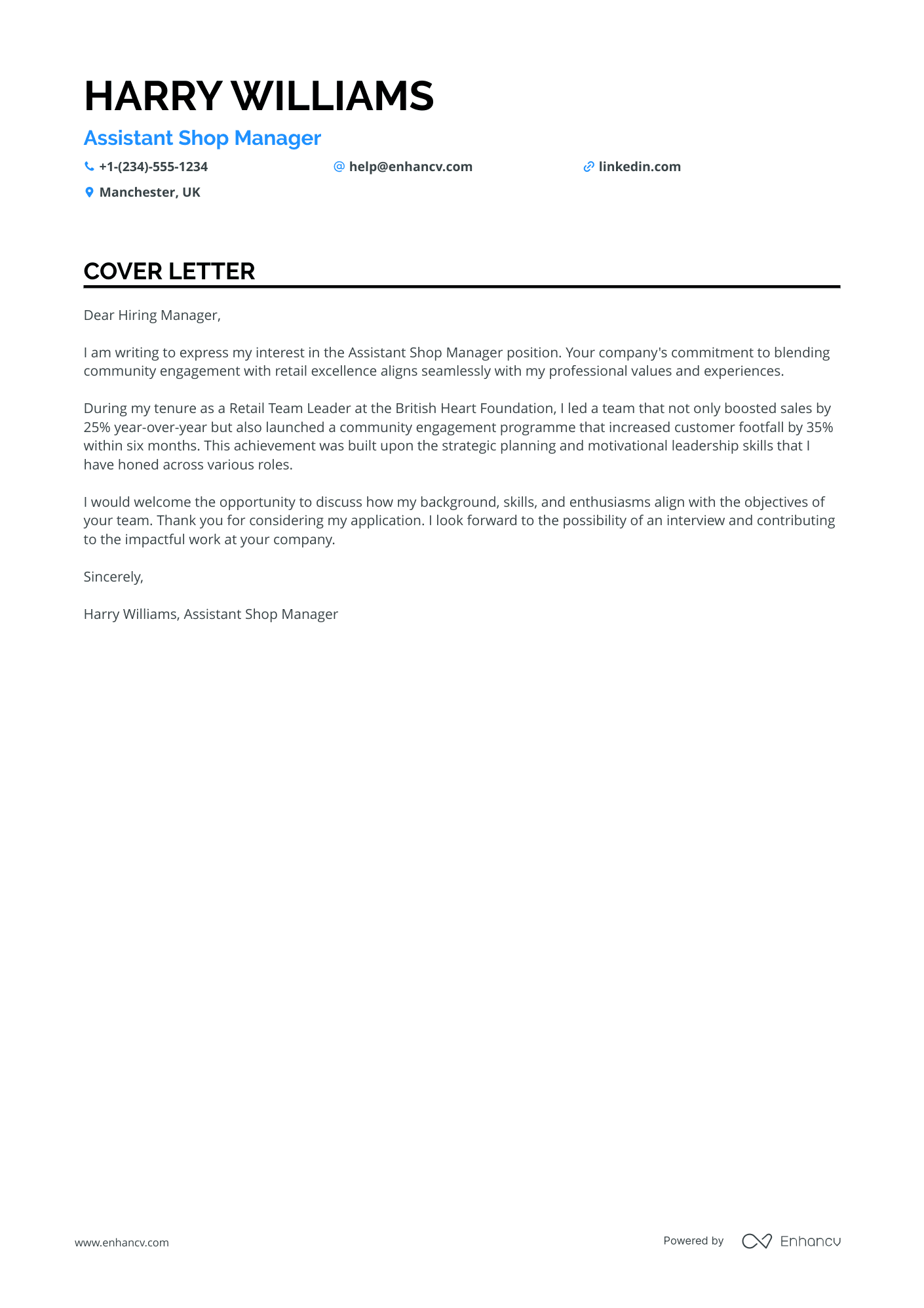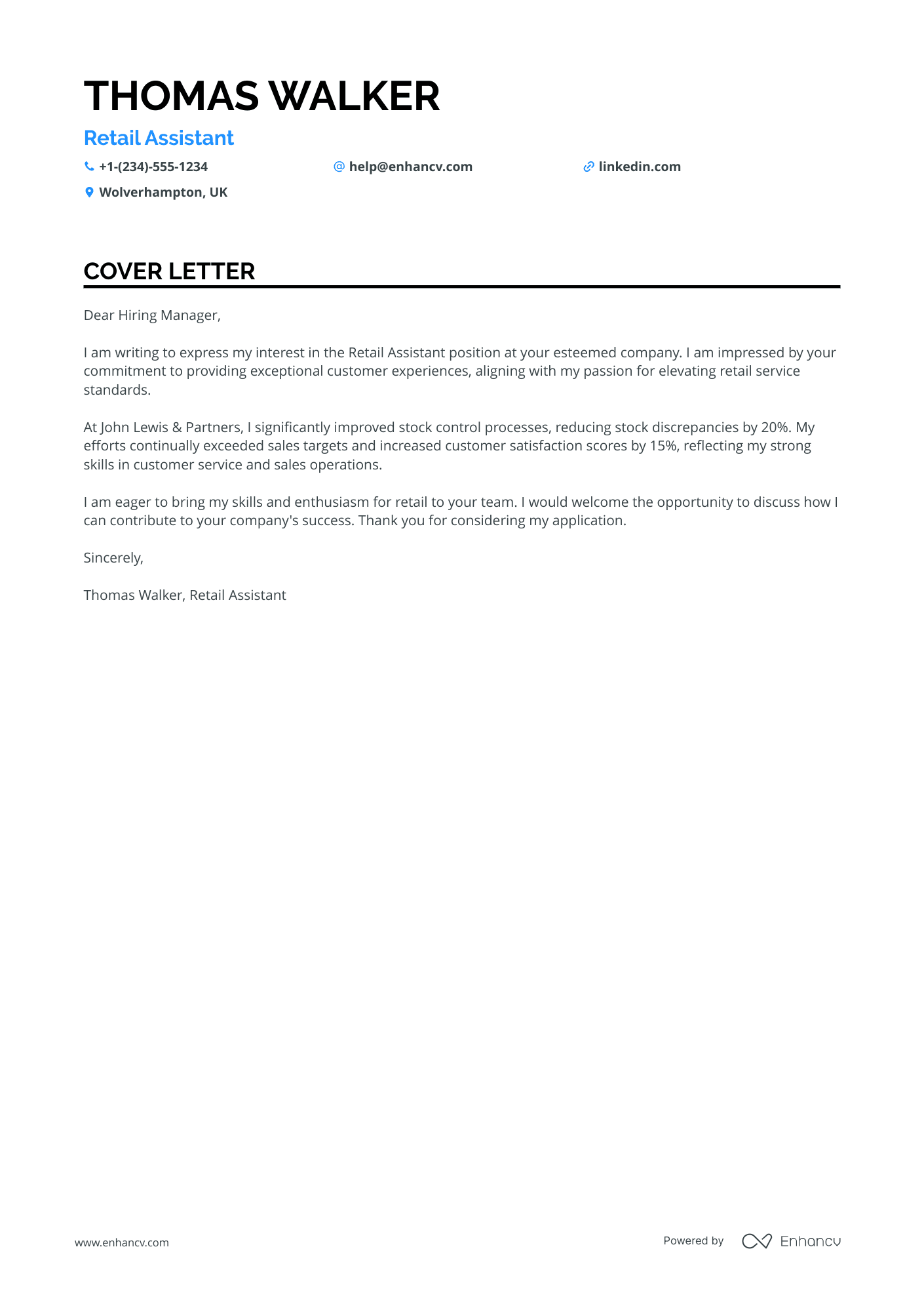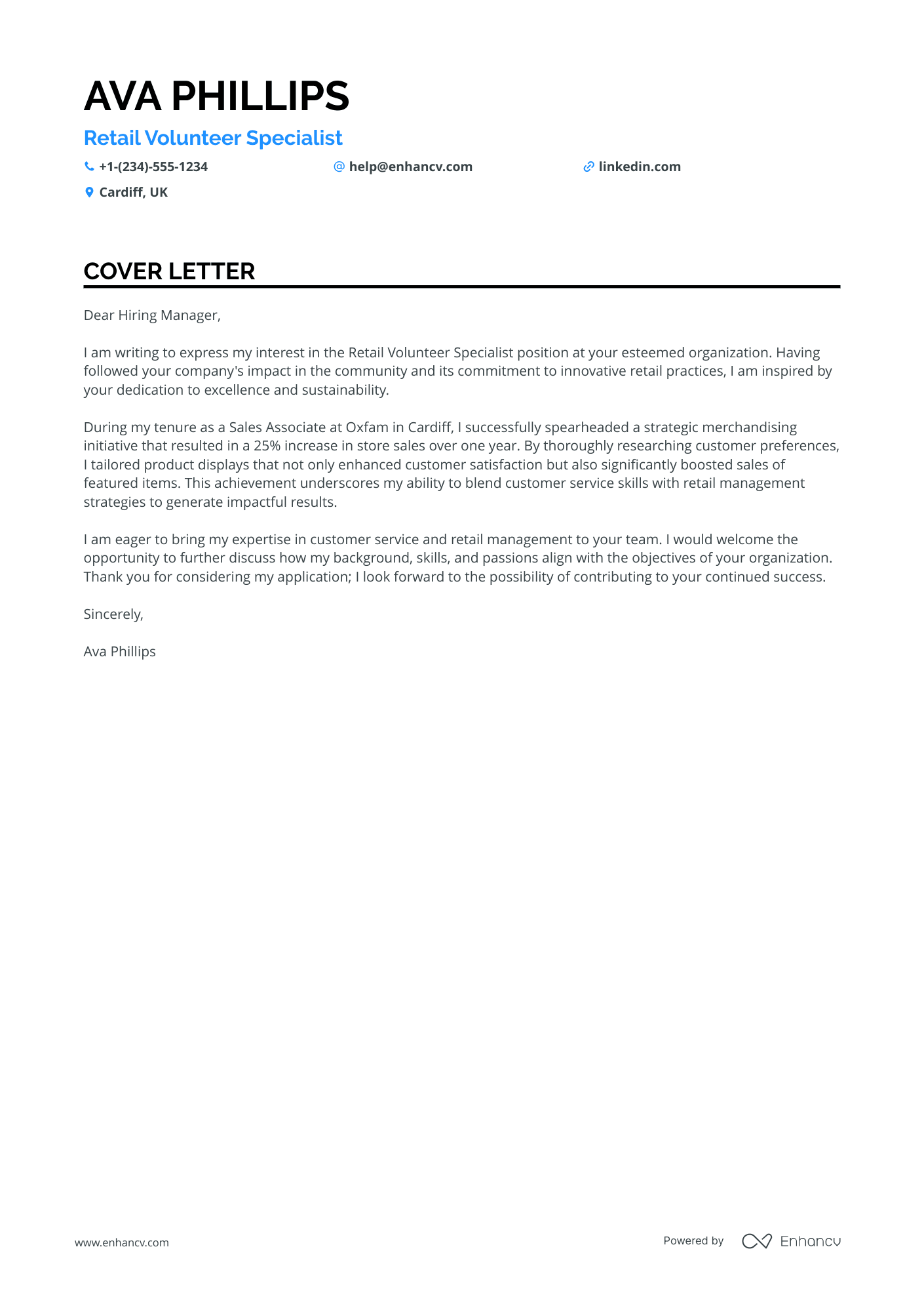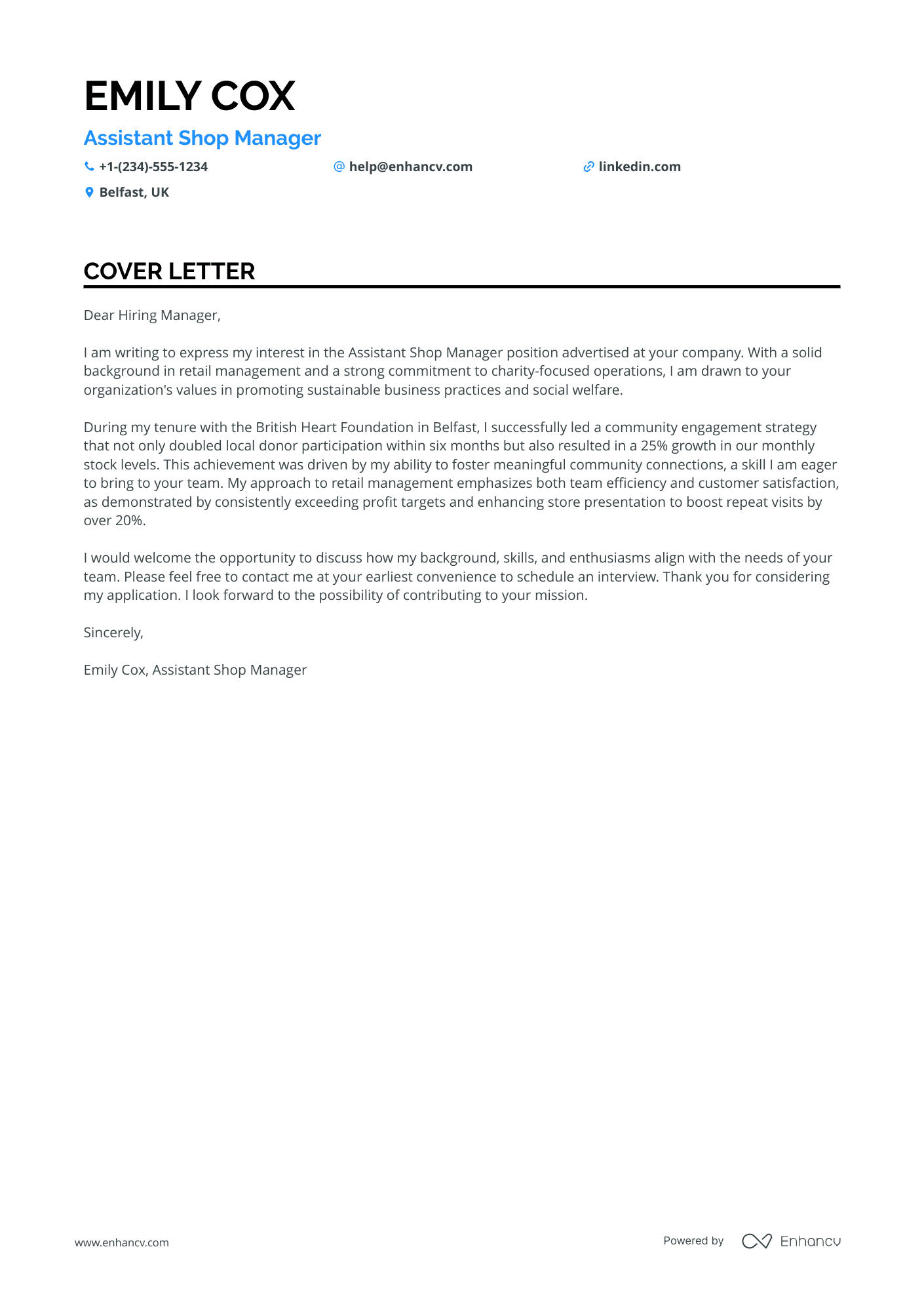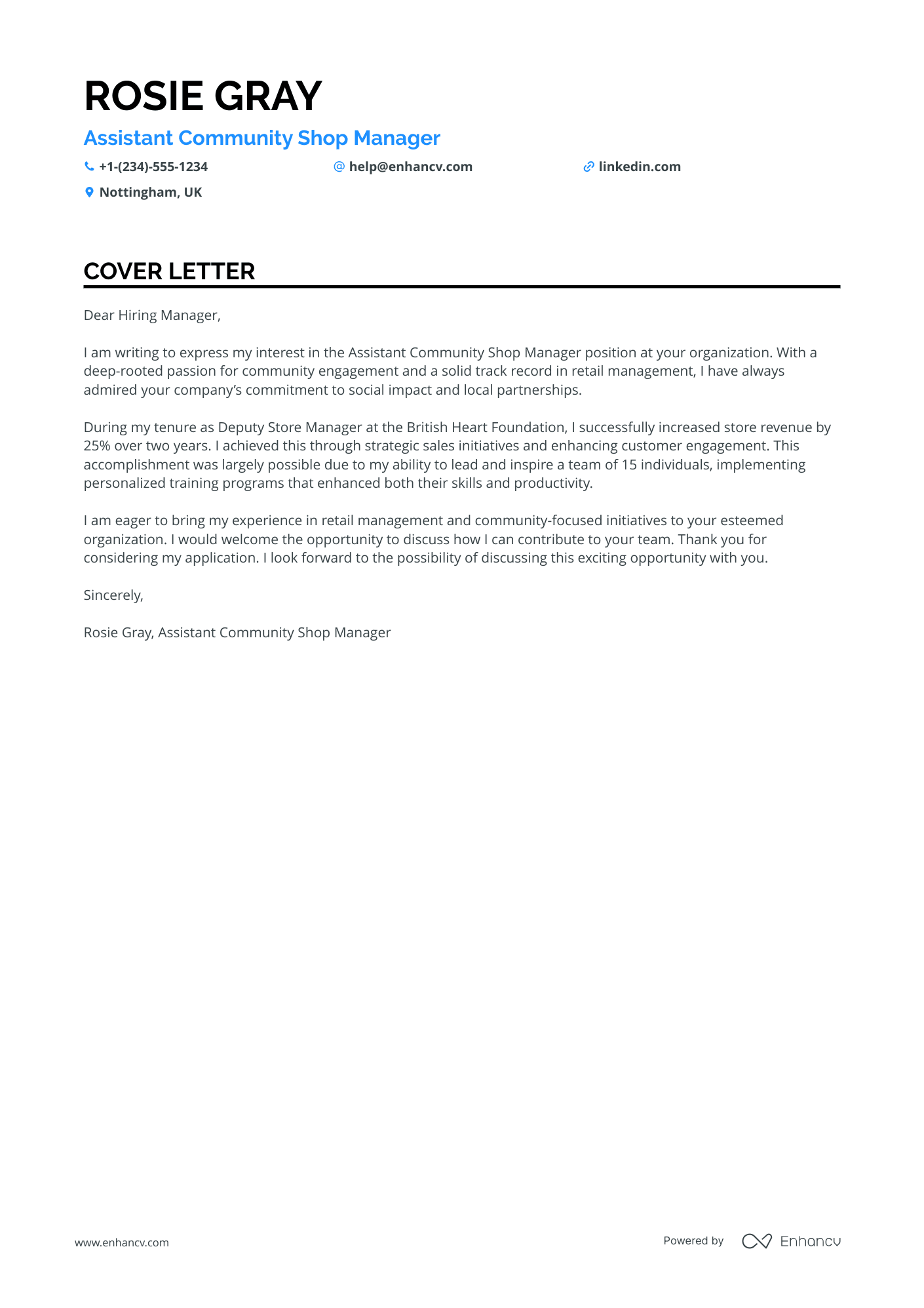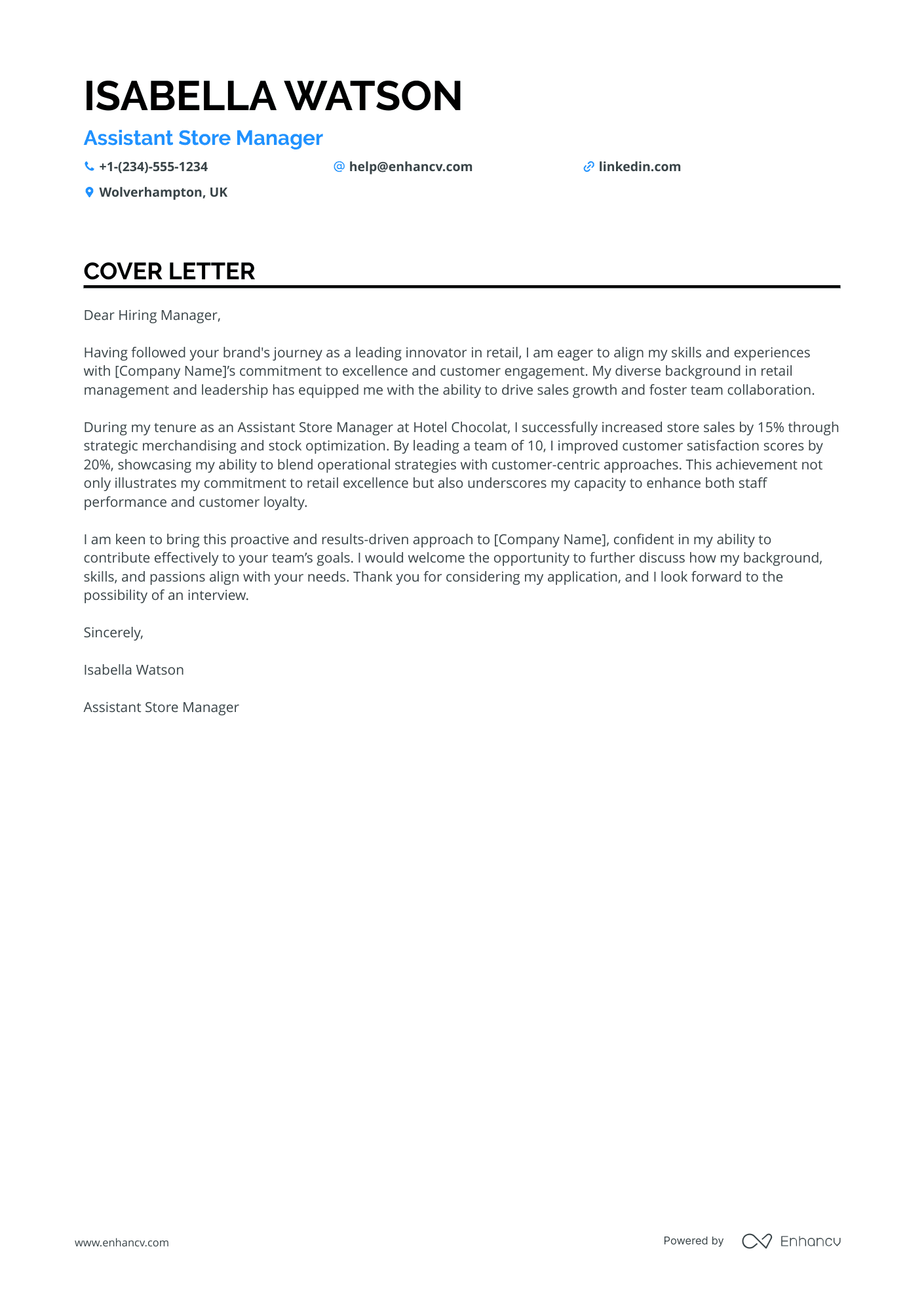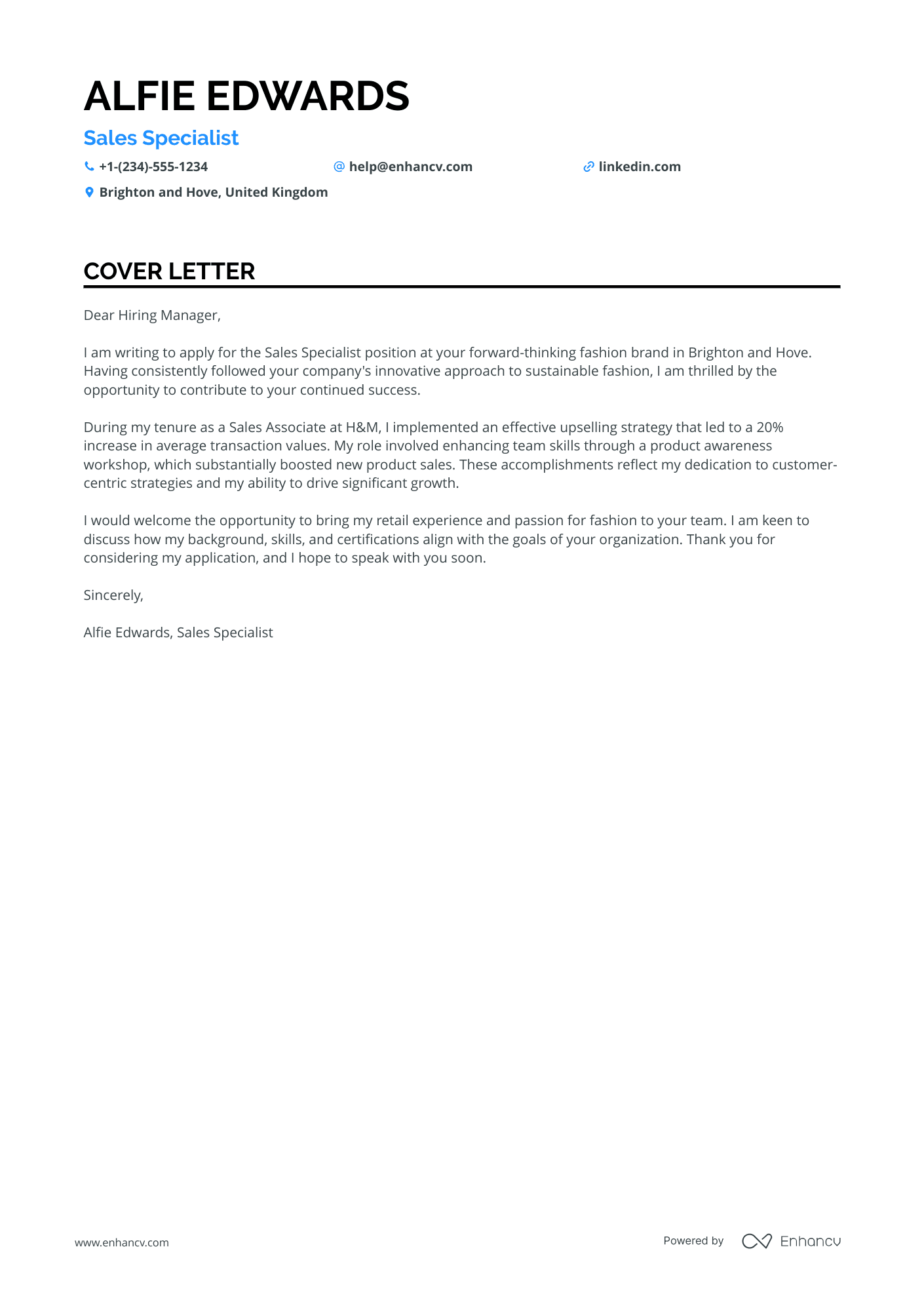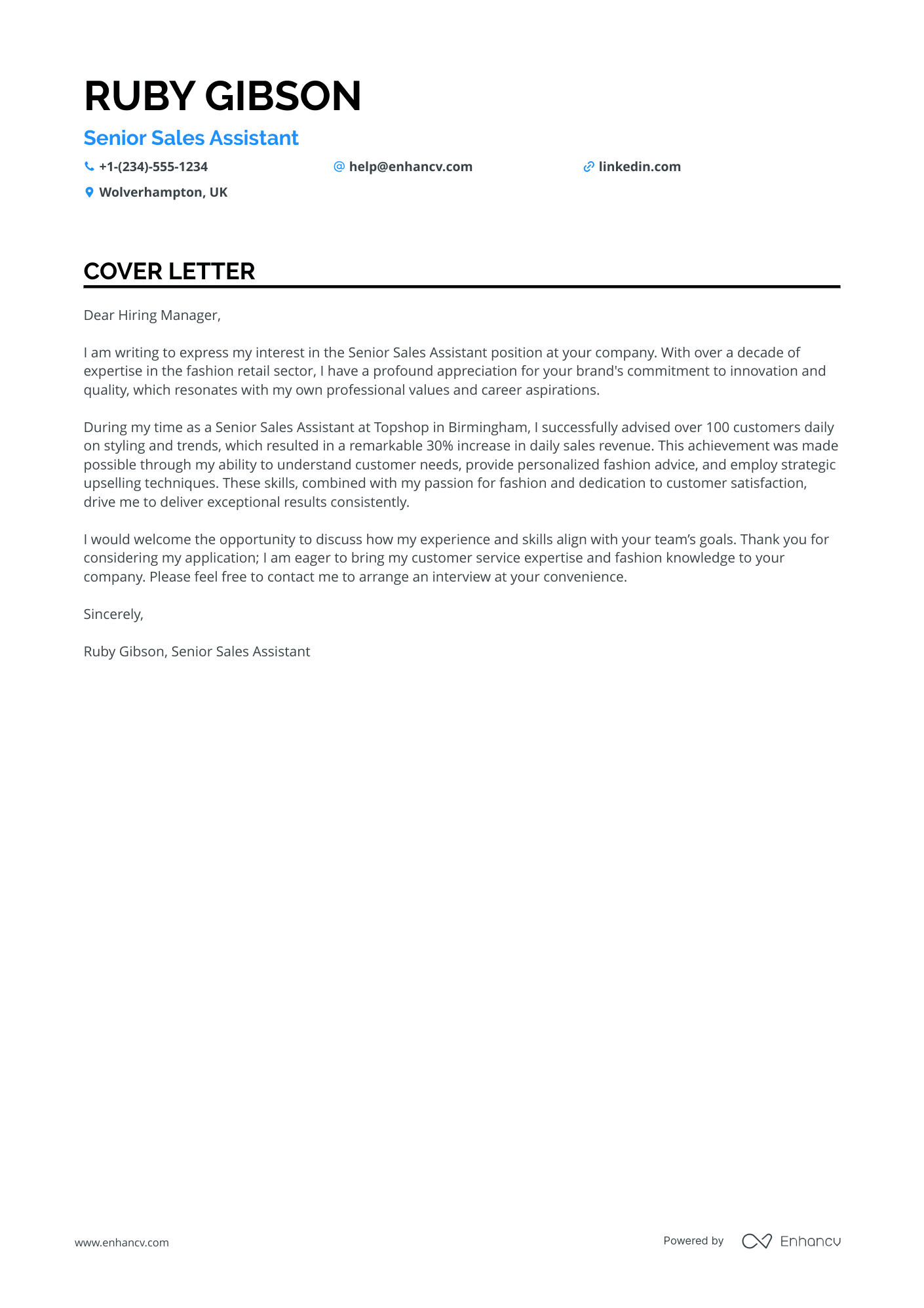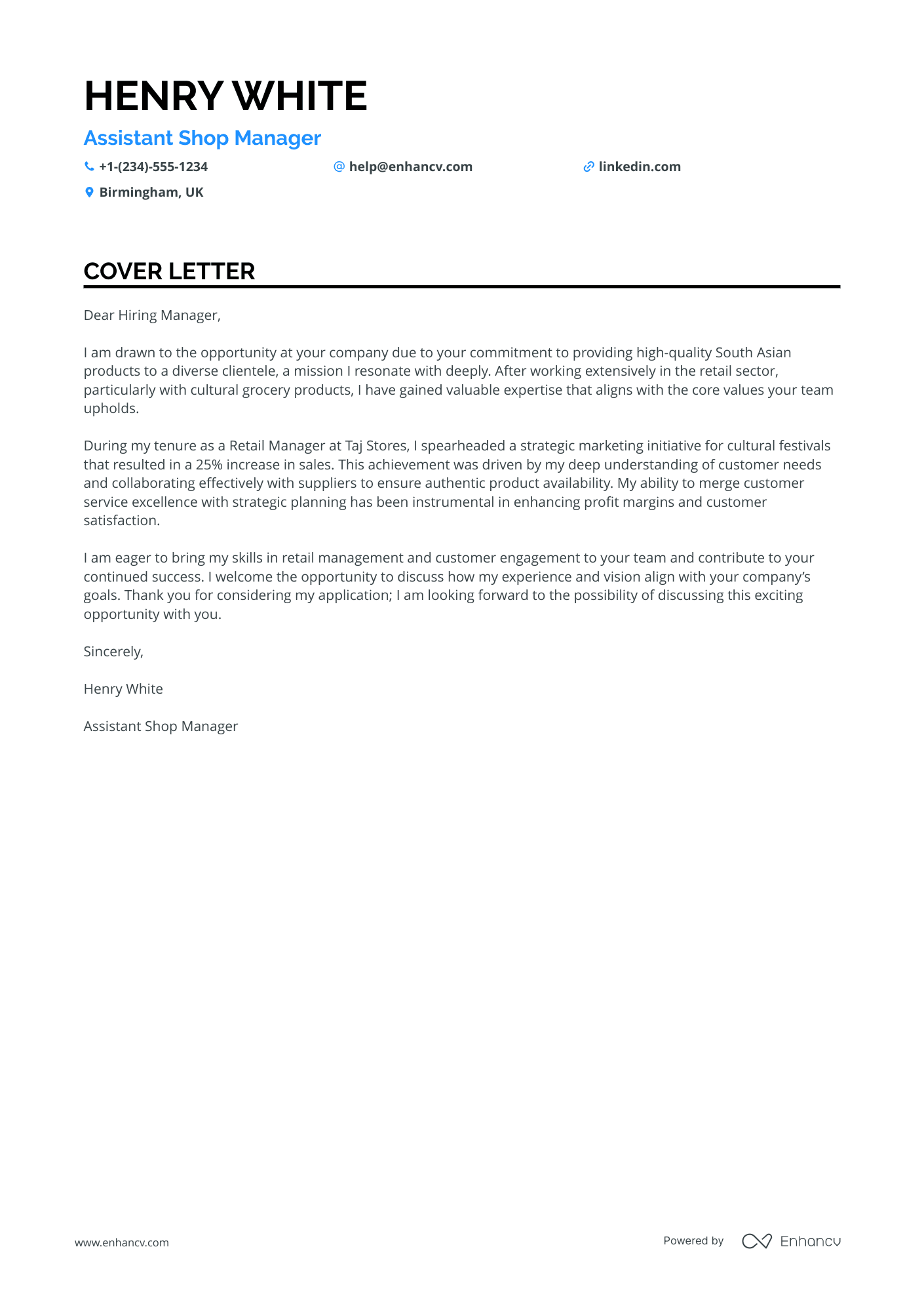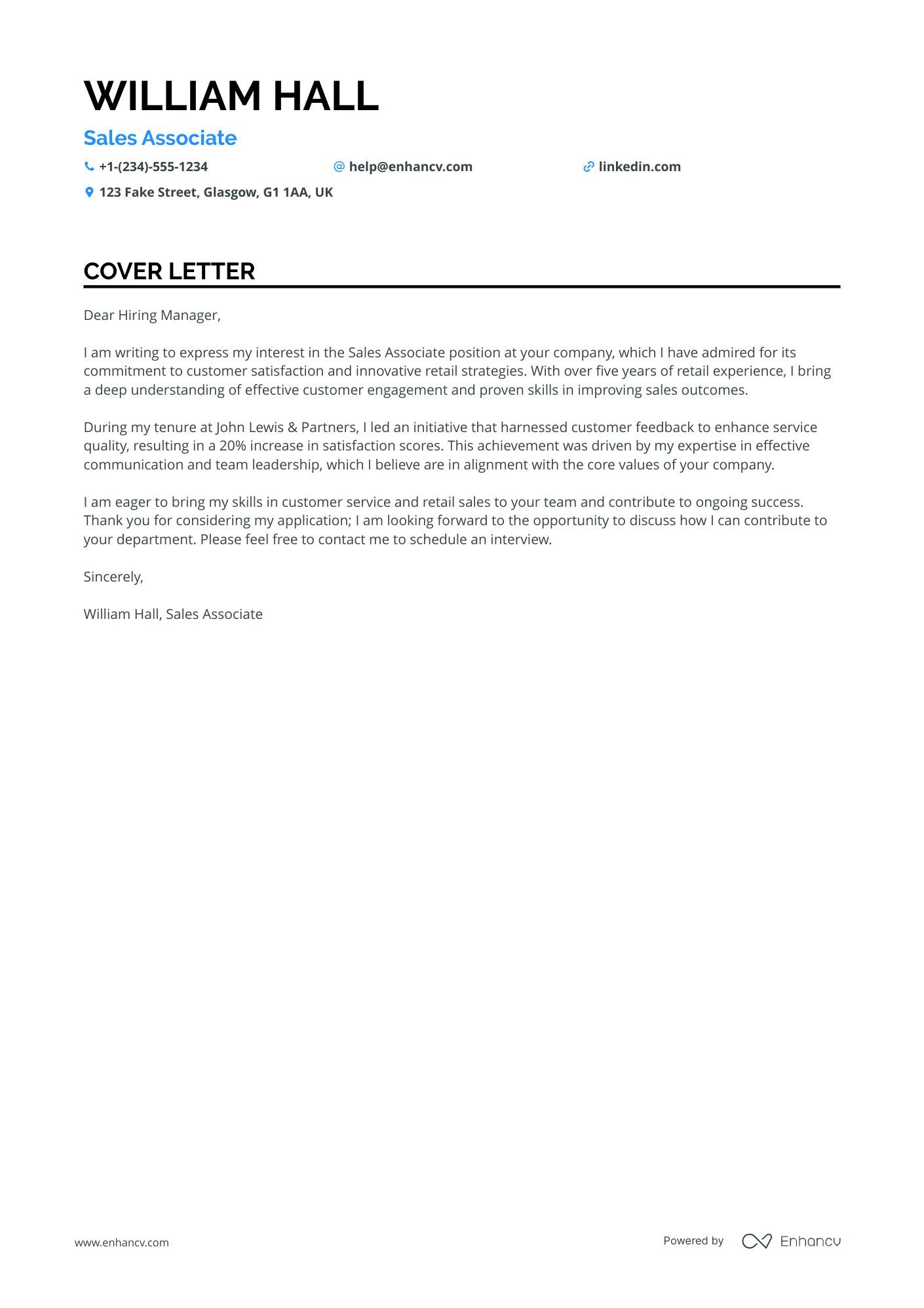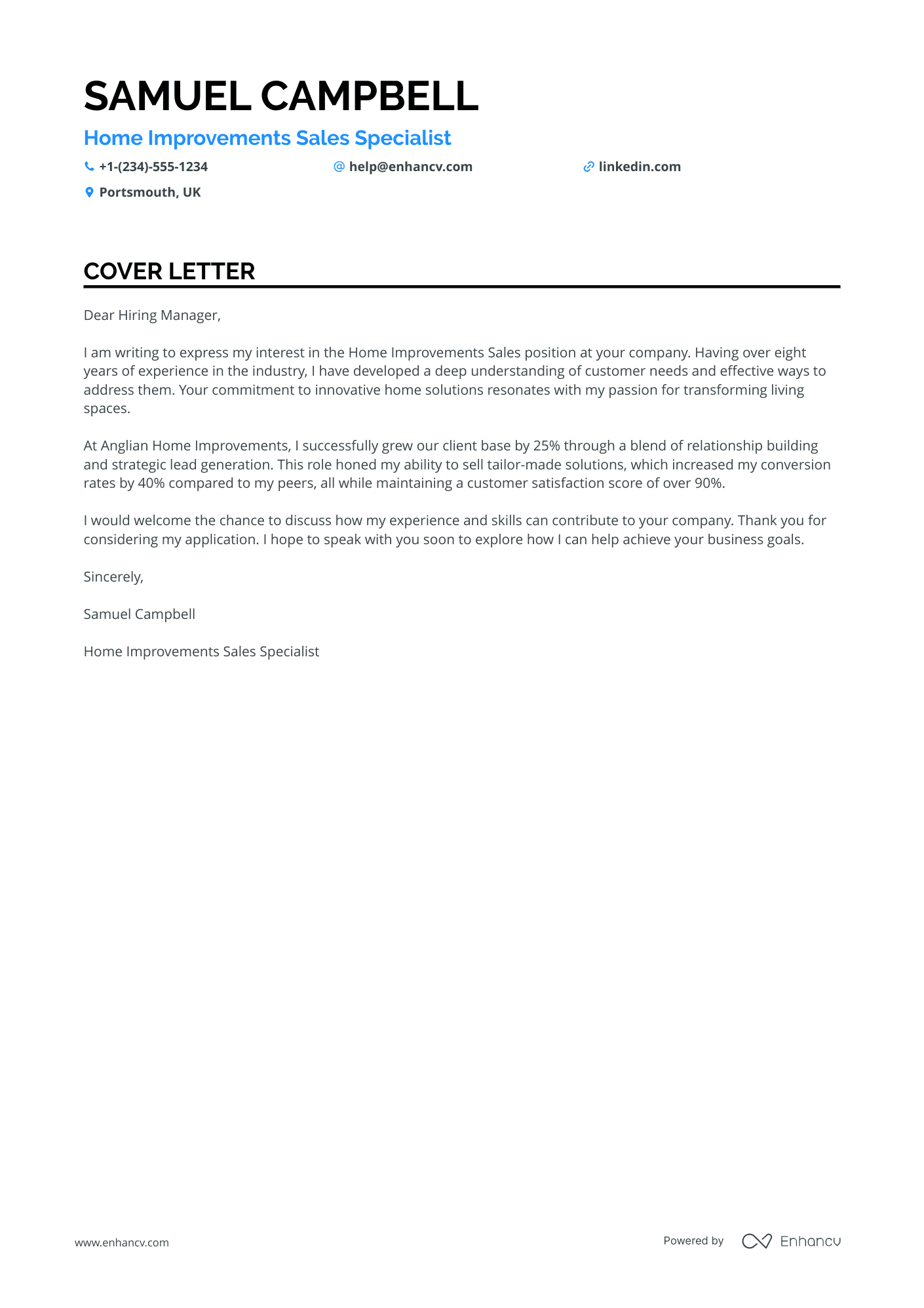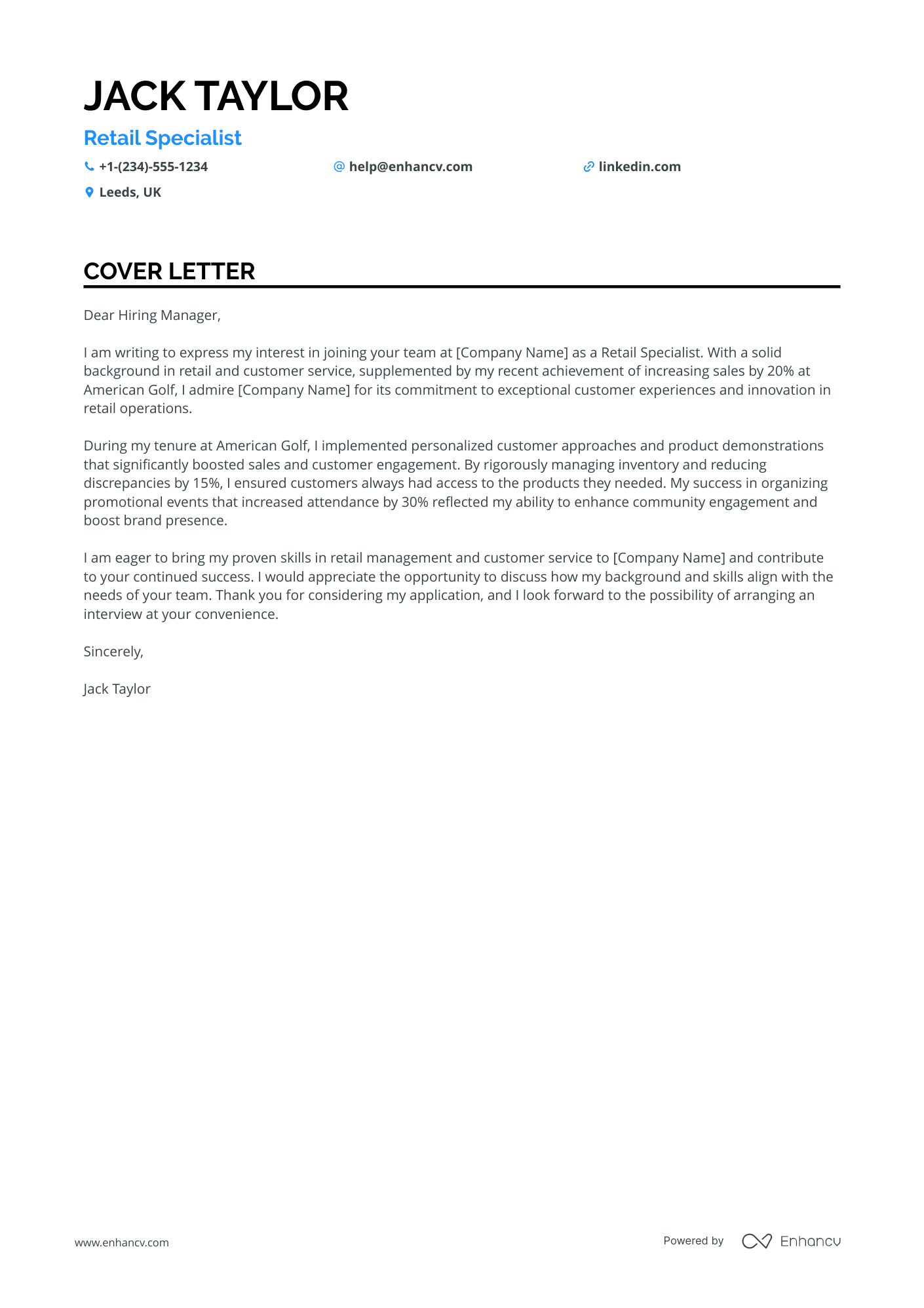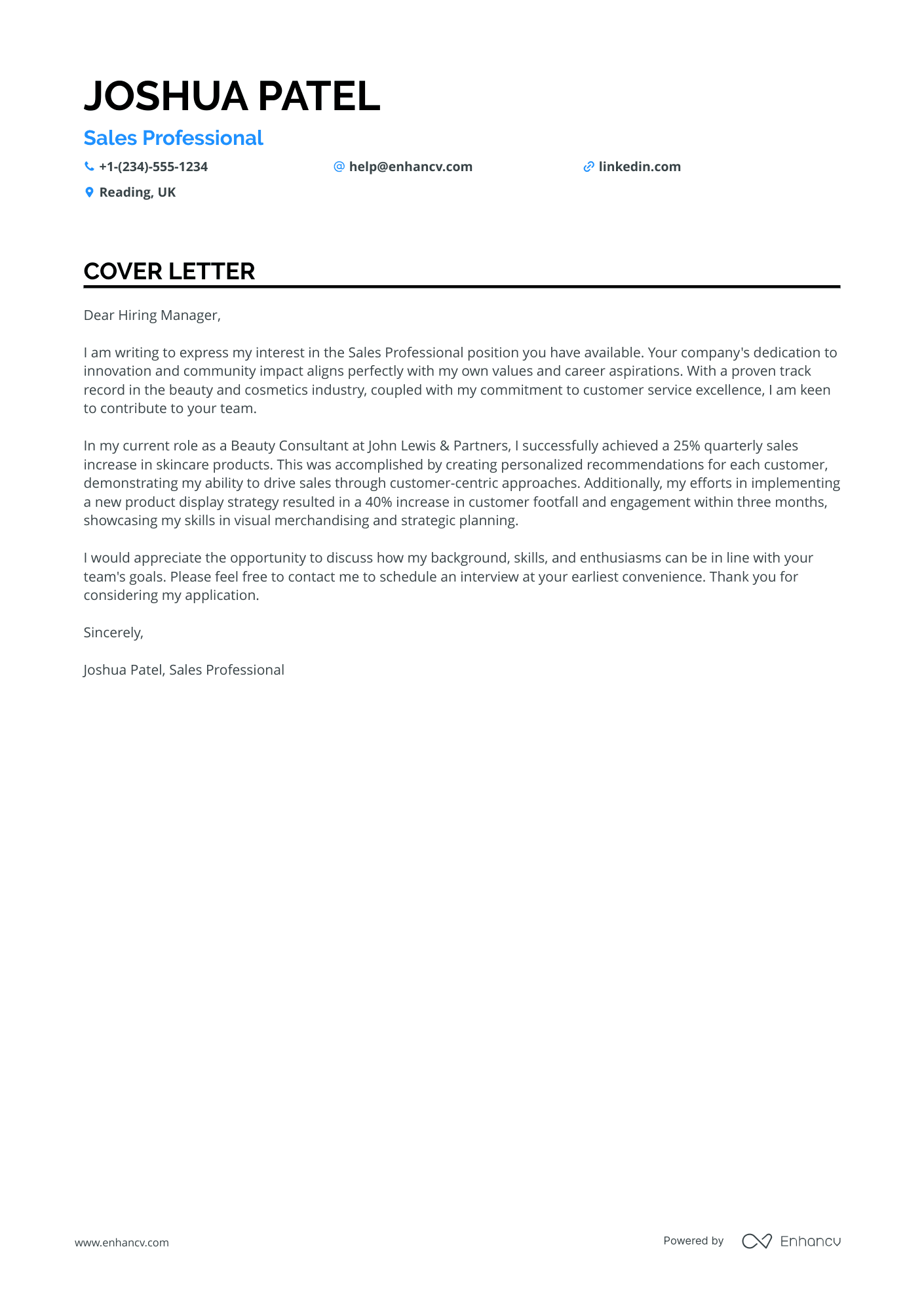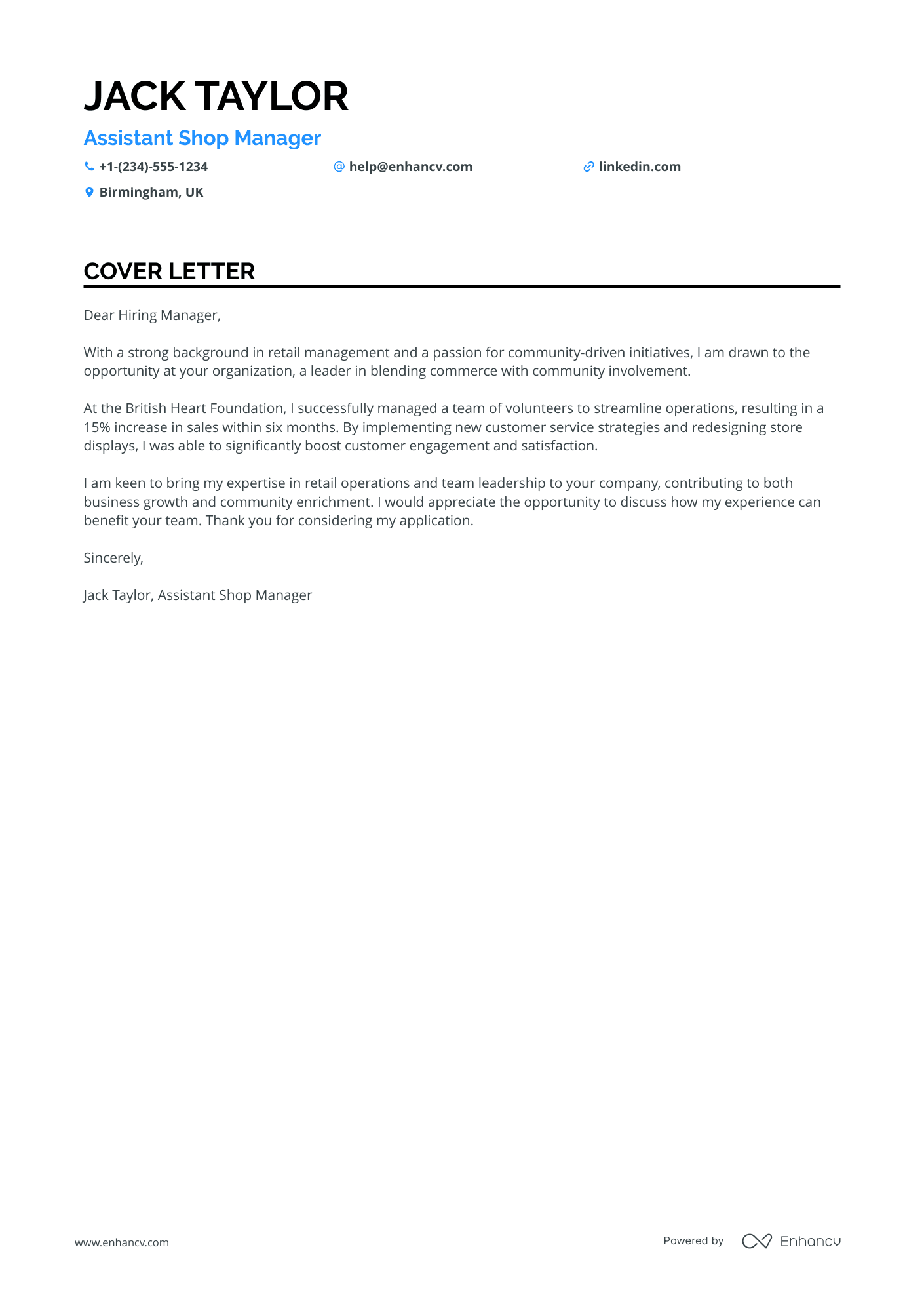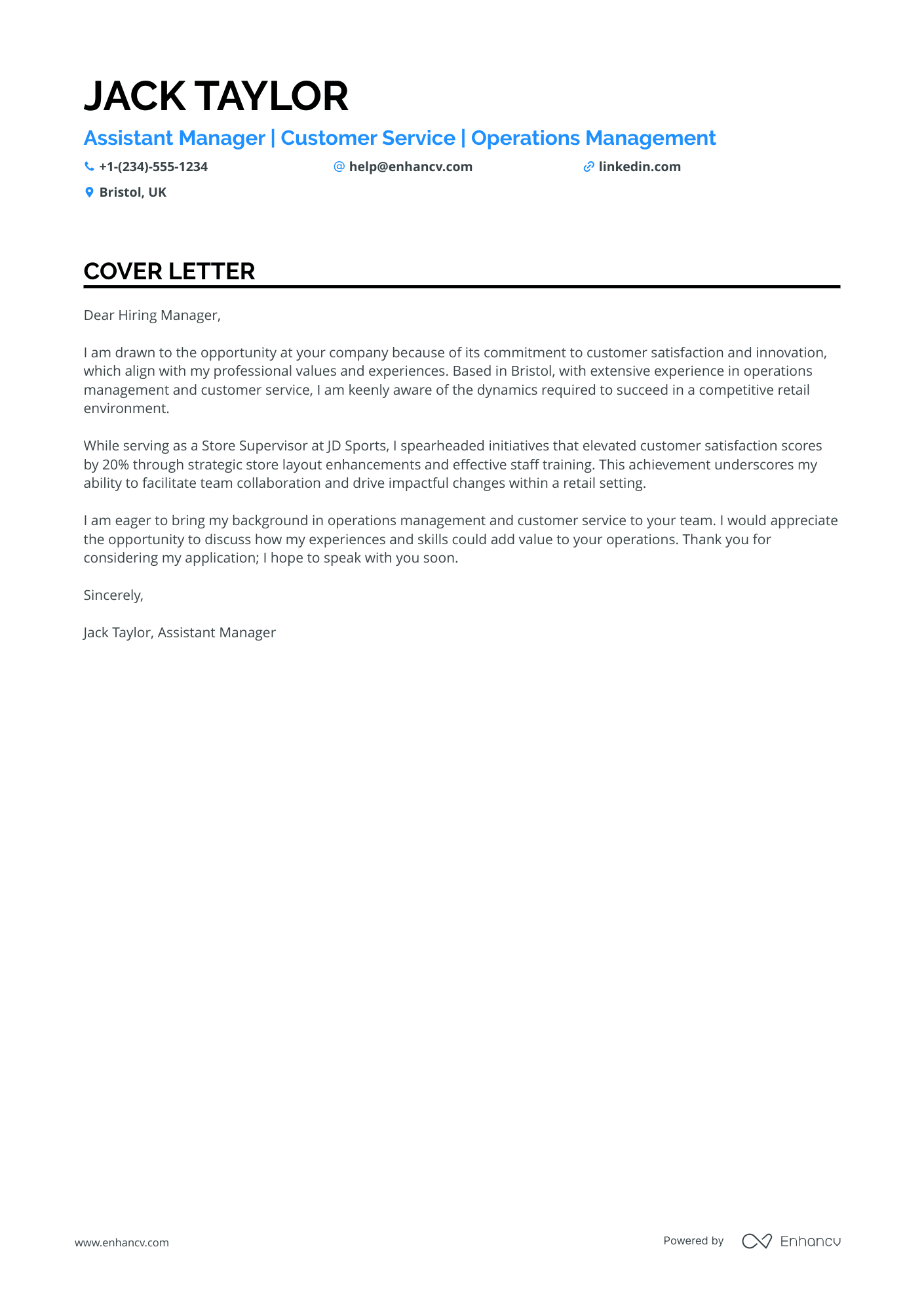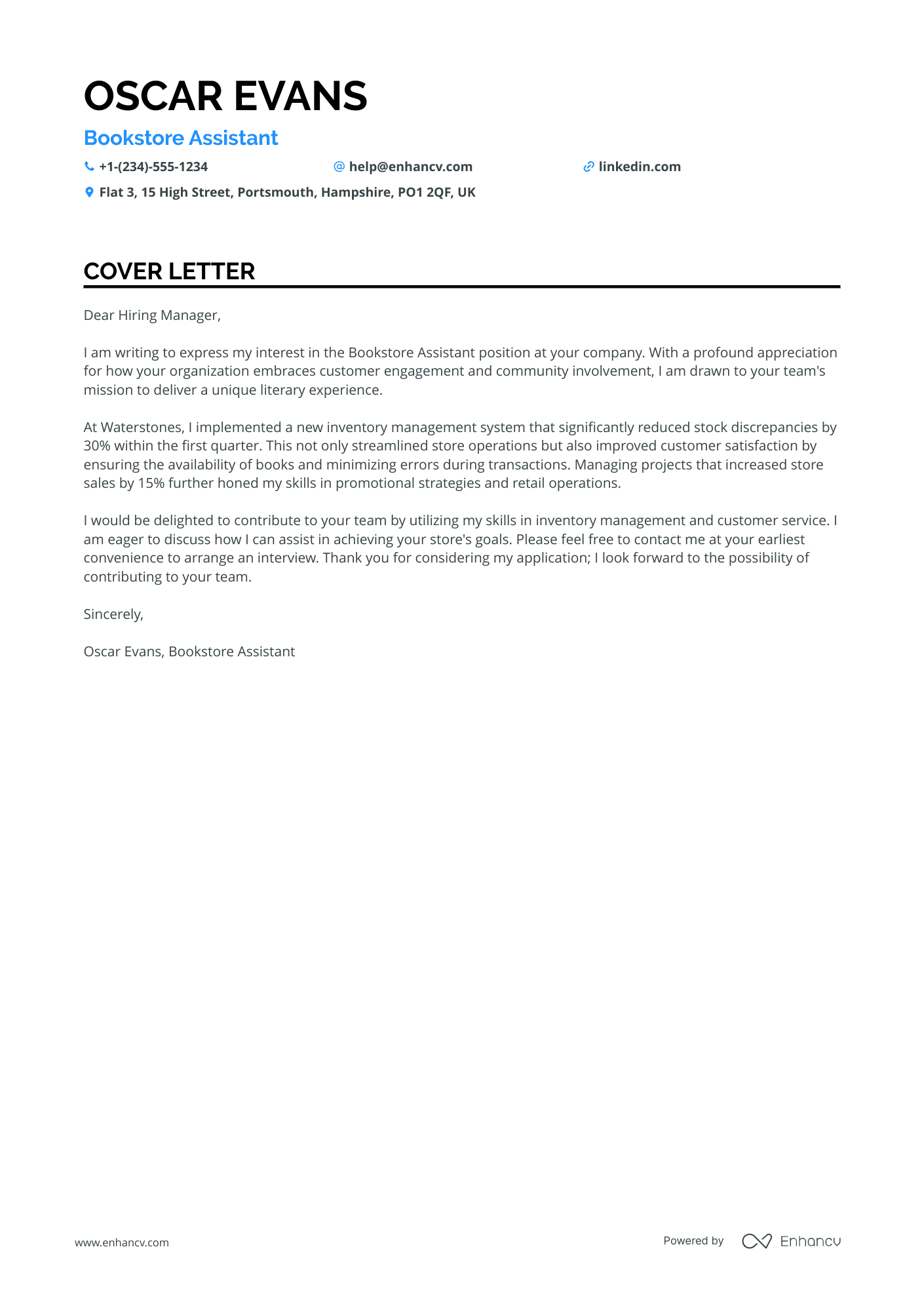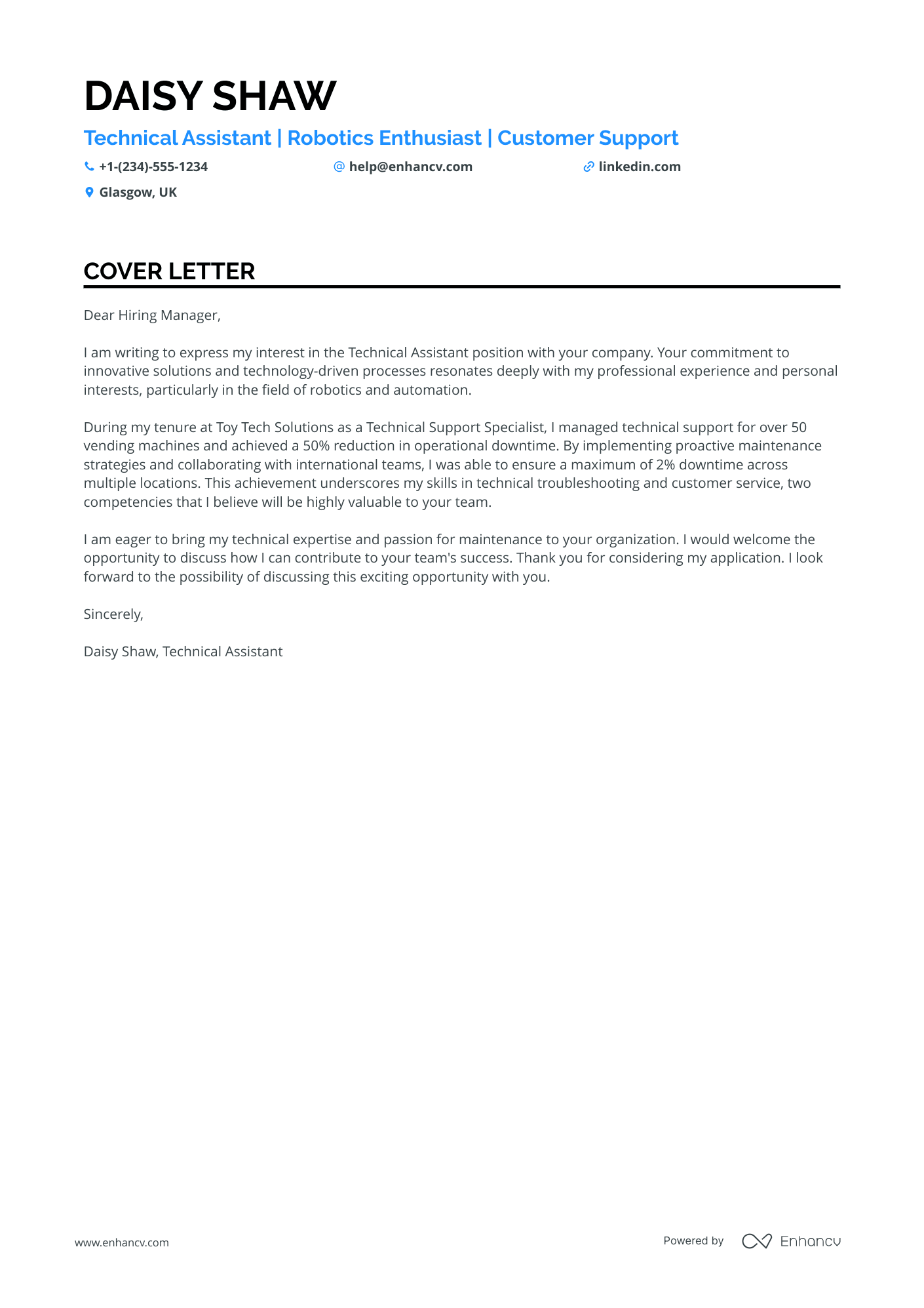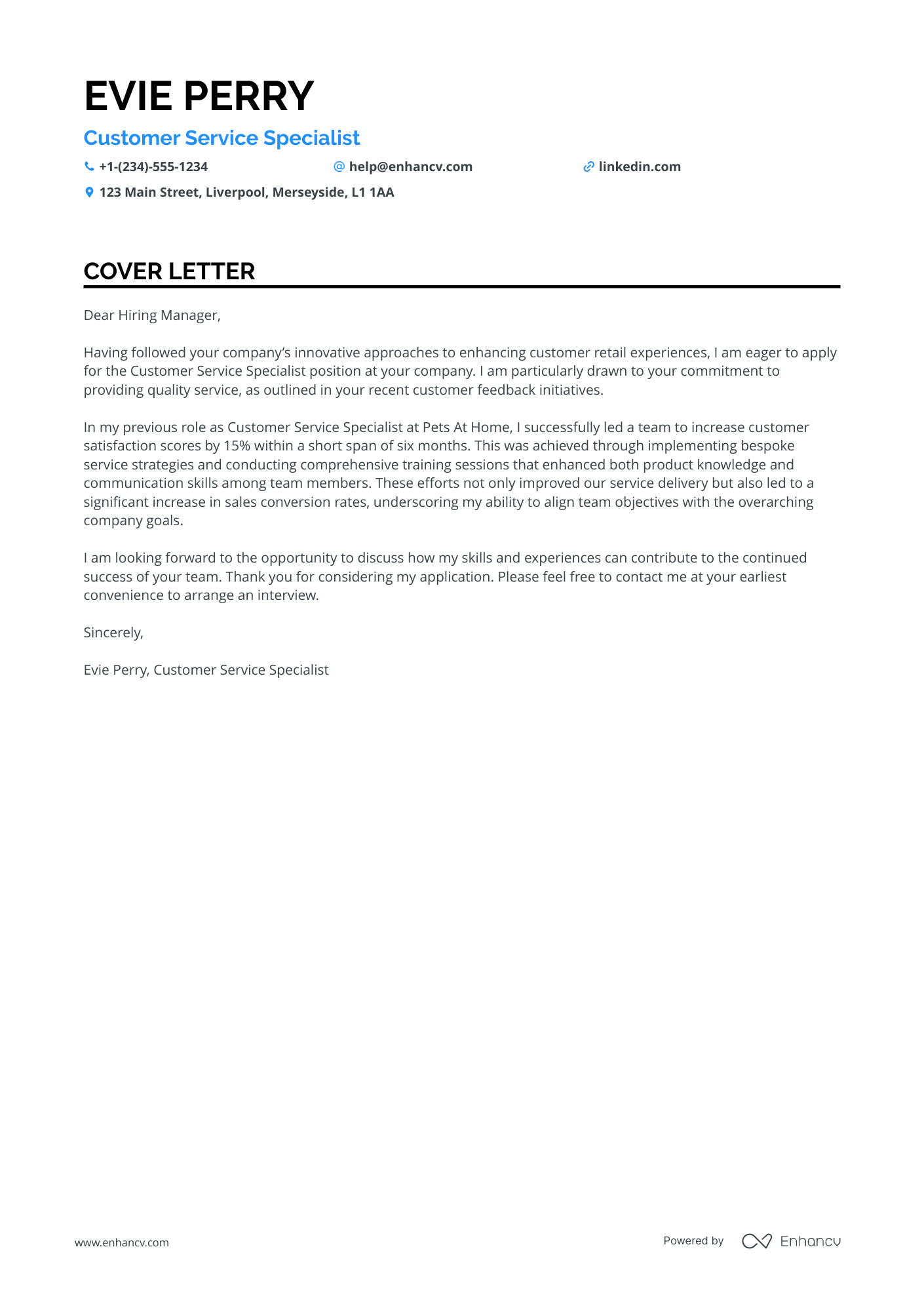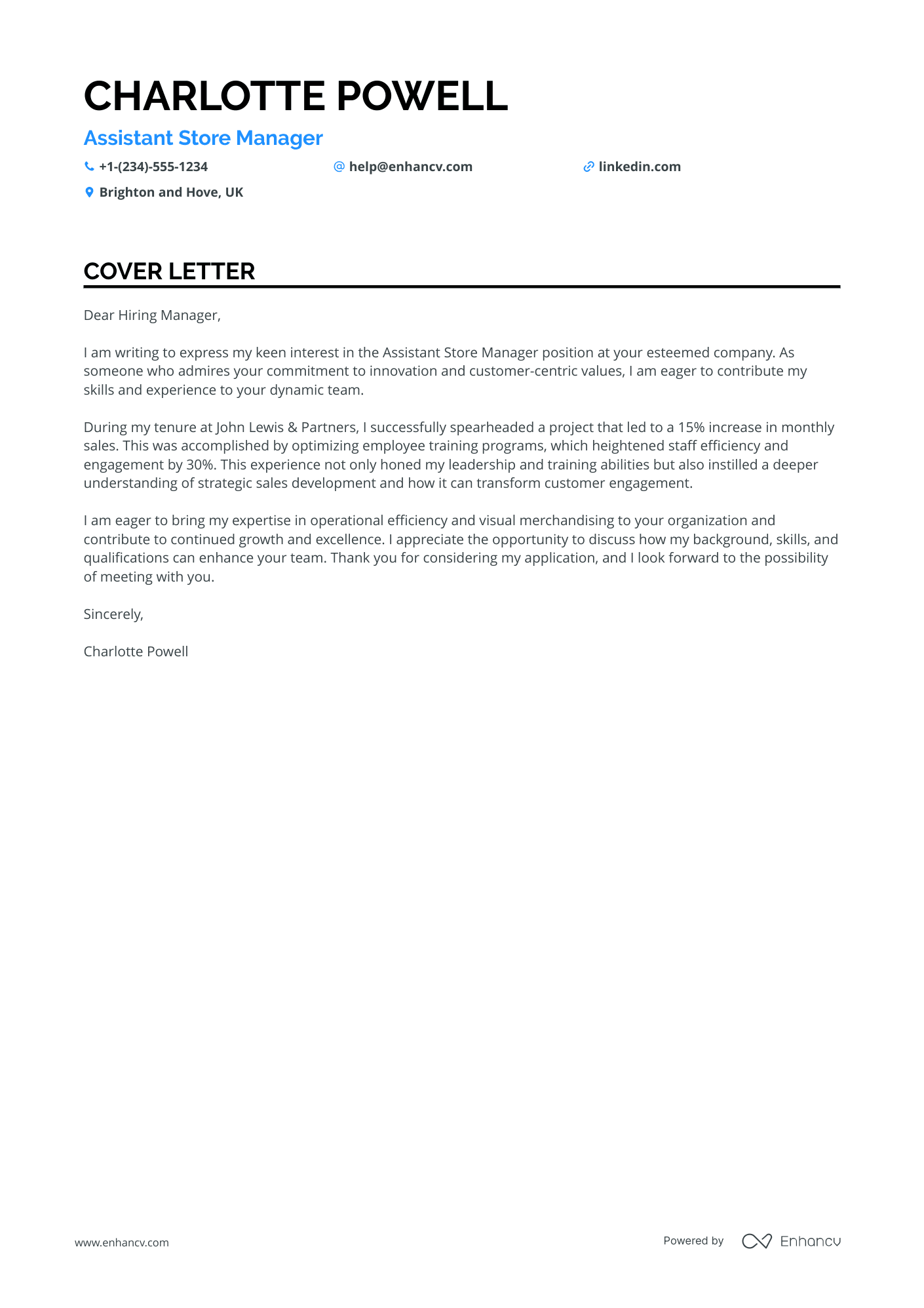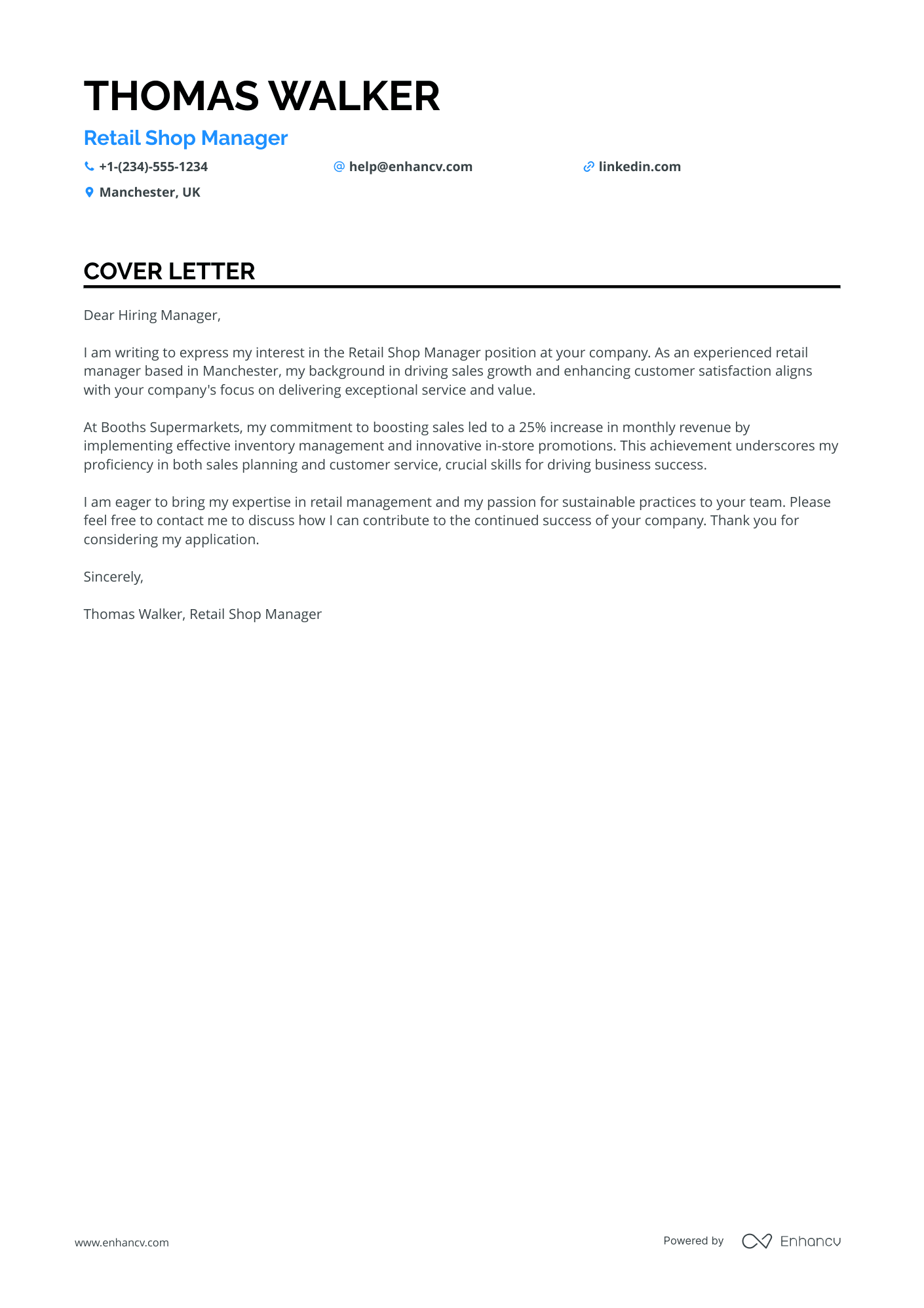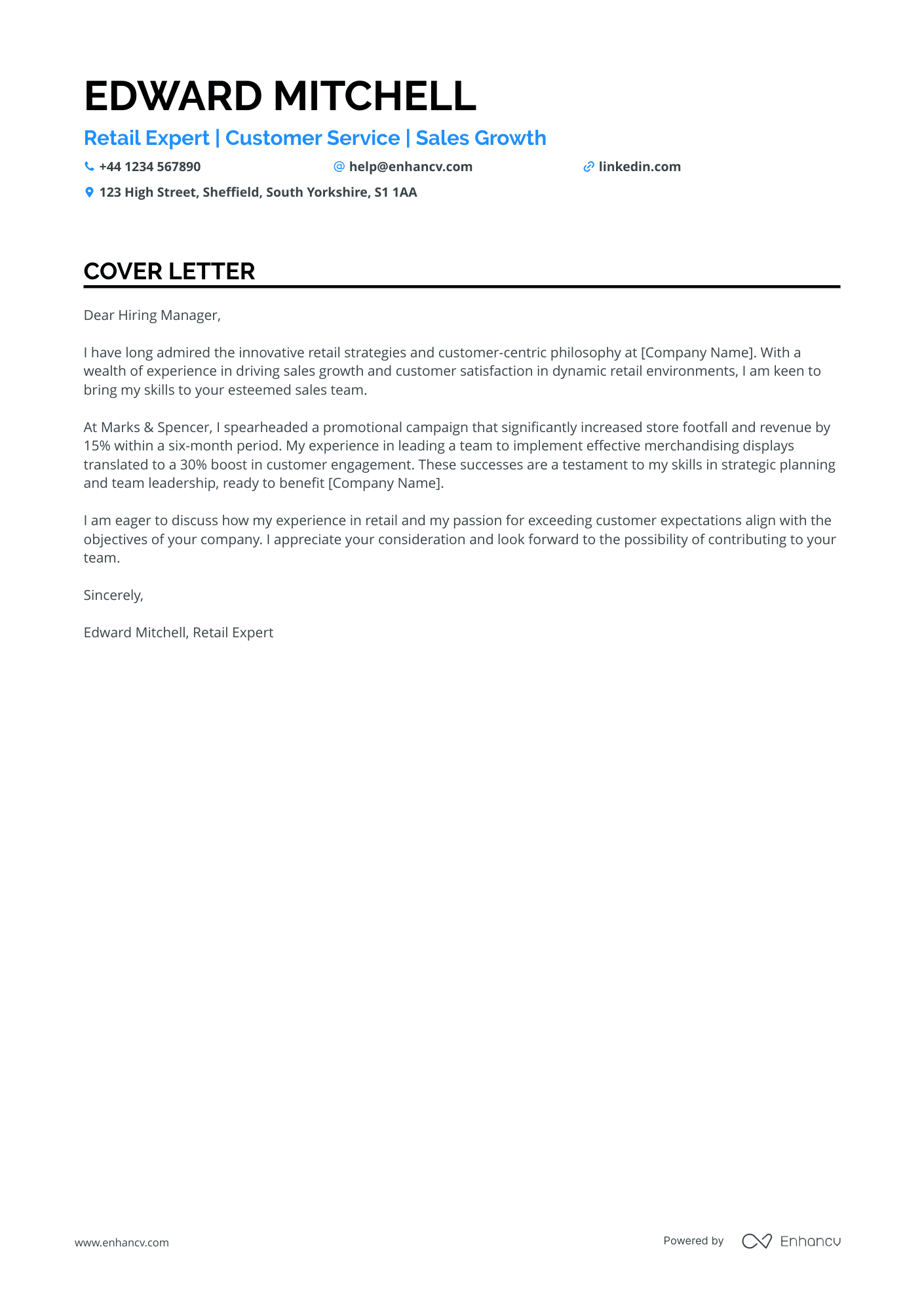You want your cover letter to strike the perfect balance between being professional and showing some personality. But how do you achieve this?
If you write too formally, your tone may come across as stiff. If you're too casual, it may sound overly conversational.
While modesty is always valued, how can you confidently present your skills without sounding arrogant or boastful?
This guide will help you find the right balance, ensuring your cover letter is both professional and personable, while focusing on the key job requirements.
Cover letter examples for shop assistant
By Experience
Senior Shop Assistant
- Emphasising specific leadership roles and quantifiable achievements, such as a 25% year-over-year sales increase and a 35% improvement in footfall, which demonstrate capability in driving business growth and team motivation.
- Highlighting community engagement initiatives and collaborations with local businesses, aligning with the role's focus on strengthening community ties and improving the brand presence.
- Mentioning relevant qualifications and courses, like the certification in Retail Leadership Skills, to reinforce subject matter expertise and specialised training in retail management and customer service.
- Referencing successful sustainability initiatives and eco-friendly practices, showcasing a commitment to environmentally conscious and socially responsible operations that may align with the company's values.
Junior Shop Assistant
- Quantifiable Achievements: Highlight accomplishments with tangible metrics like reducing stock discrepancies by 20% and improving customer satisfaction scores by 15% to demonstrate effectiveness in previous roles.
- Skills and Certifications: Emphasise skills like Customer Service and Sales Operations alongside certifications such as the Retail Management Certification, which align with job requirements and showcase professional commitment.
- Relevant Work Experience: Include detailed descriptions of roles in relevant companies, such as John Lewis & Partners and Marks & Spencer, to demonstrate a strong background in retail and customer service environments.
- Leadership and Mentoring: Highlight experience in training and mentoring new hires, which showcases leadership qualities and ability to contribute positively to team development and operations.
Trainee Shop Assistant
- Highlighting Ava's experience in retail and customer service roles at reputable charity organisations enhances her credibility and demonstrates her commitment to community-focused work.
- Emphasising her achievement in increasing store sales by 25% through strategic merchandising showcases her ability to drive performance and improve operational success.
- Mentioning specific skills such as "Stock Management" and "Visual Merchandising" directly aligns with the requirements of a Retail Volunteer Specialist position, demonstrating her technical competencies.
- Featuring her proficiency in both English and Welsh can be particularly advantageous for roles in diverse, multilingual communities, improving communication and customer service.
Experienced Shop Assistant
- Relevant Experience: Highlighting Emily's role as Assistant Shop Manager at the British Heart Foundation and discussing specific achievements, such as increasing store donations by 25%, underscores her capability and successful track record in retail team leadership and charity-focused environments.
- Quantifiable Success: The cover letter details numerical achievements, like a 30% increase in income through the Gift Aid scheme and a 20% boost in repeat customer visits, offering a concrete demonstration of impact and effectiveness.
- Specialised Skills: Emily’s experience in volunteer management, as well as developing training programmes, aligns perfectly with the need for strong leadership and people-management skills, particularly important in charity shop management roles.
- Professional Development: Mention of relevant courses such as the "Charity Retail Leadership Programme" and "Advanced Sales Techniques in Retail" serve as evidence of continuous learning and a commitment to professional growth in retail leadership.
Shop Assistant Manager
- Emphasis on certification and courses such as "Retail Leadership Excellence" and "Health and Safety for Retail" which demonstrate specialised knowledge and commitment to continuous improvement in retail management.
- Highlighting specific accomplishments like a 25% increase in store revenue through strategic initiatives which showcases results-oriented achievements applicable to the role.
- Focusing on leadership and volunteer coordination skills reinforced by leading a team of 15, demonstrating the ability to lead, develop, and enhance team productivity.
- Inclusion of community engagement and partnership accomplishments, such as generating £10,000 through local collaborations, which aligns with the role's focus on community-based retail initiatives.
Head Shop Assistant
- Demonstrate Leadership Skills: This cover letter effectively highlights leadership abilities, citing examples of successful team management and development, which are crucial for an Assistant Store Manager role.
- Highlight Quantifiable Successes: It is important to provide specific metrics to showcase achievements, such as increased sales percentages and improved customer satisfaction scores, to illustrate capabilities and impact concretely.
- Showcase Relevant Experience: Including past experiences in similar roles, such as Assistant Store Manager and Retail Supervisor roles, helps demonstrate relevant expertise and industry knowledge.
- Emphasise Customer-Centric Approach: Stressing the implementation of customer feedback programmes and customer-centric certifications aligns well with roles that value customer experience and satisfaction.
By Role
Shop Assistant in Retail
- Highlighting Achievements: The cover letter should effectively showcase notable achievements such as the "Customer Satisfaction Award" and "Sales Champion." These accolades reflect Alfie's success and commitment in sales and customer service, which are critical for the role of a Sales Specialist.
- Emphasising Relevant Skills and Experience: Alfie's experience in sales and customer service roles at H&M, Next, and Topshop, along with skills in sales techniques, conflict resolution, and visual merchandising, directly support the qualifications needed for a role focused on sales and customer service in fashion retail.
- Specific Course and Certification Mention: Including completed courses such as "Retail Management Certification" and "Fashion Buying and Merchandising" underlines Alfie’s proactive approach to gaining industry-relevant expertise, which is beneficial for career progression in retail management and fashion buying.
- Demonstrating Passion and Commitment: Alfie's expressed passion for fashion retail, sustainability, and his dedication to keeping abreast of fashion trends, not only supports the professional narrative but also aligns well with what employers in fashion retail often seek in candidates.
Shop Assistant in Fashion
- Emphasise Customer Service Expertise: The cover letter highlights exceptional customer service skills and the ability to engage customers effectively, crucial for a role in sales and fashion retail.
- Demonstrate Sales Success: Specific metrics such as increasing sales by consistently exceeding targets by 25% are showcased, underscoring the applicant's capability in driving sales performance.
- Mention Leadership Skills: Experience in training and mentoring junior staff, managing teams, and reducing staff turnover demonstrates the applicant's leadership capabilities, valuable for a senior sales role.
- Incorporate Passion and Engagement: The cover letter effectively communicates a genuine passion for fashion and customer service, aligning with the role's requirements and the company's culture.
Shop Assistant in Grocery
- Experience and Achievements: The cover letter highlights over 7 years of experience in retail management, with a focus on grocery products and specialised knowledge in South Asian and halal food products, showcasing both expertise and dedication to the field.
- Certifications and Courses: The inclusion of a course in "Halal Food Certification and Compliance" demonstrates a deep understanding of sector-specific regulations, which is essential for roles involving halal products.
- Skill Acquisition: Emphasis on skills such as supplier coordination and inventory management, alongside proven achievements like the expansion of the supplier network and efficient inventory management, make a compelling argument for capability in enhancing retail operations.
- Community and Cultural Engagement: The cover letter illustrates involvement in community activities and diversity knowledge, which is valuable for roles that require engagement with diverse cultural backgrounds, enhancing customer relations and service experience.
Shop Assistant in Electronics
- Emphasising achievements in elevating customer satisfaction and sales targets, such as the 20% increase in customer service satisfaction scores, highlights results-driven qualities vital for a sales associate.
- Highlighting experience in training and mentoring new hires to boost team productivity indicates leadership capabilities that are beneficial in a sales and customer service environment.
- Including a course such as "Effective Communication in Retail" shows ongoing professional development and a commitment to improving relevant skills, enhancing the candidate's suitability for customer-oriented roles.
- Detailing multilingual proficiency, particularly in Spanish, can be advantageous in enhancing communication and service in diverse retail environments, potentially expanding the customer base.
Shop Assistant in Home Improvement
- Highlighting Key Achievements: The cover letter effectively emphasises major achievements such as the "Top Sales Performer" award and a 25% increase in repeat sales and referrals, showcasing the candidate's excellence in sales and customer retention.
- Specifications of Relevant Certifications and Courses: It underscores relevant certifications and courses, like the "Professional Sales Certificate" and "Home Renovation & Design" course, aligning with the specialised skills required for a sales role in home improvements.
- Focus on Relevant Experience: The detailed account of past roles with companies like Anglian Home Improvements and Wickes reflects the candidate's direct experience and specialisation in the home improvement sales sector, bolstering the application with relatable experience.
- Proficiency in a Secondary Language: Mentioning proficiency in French, albeit lower than in English, indicates potential advantages in client interactions or negotiations in a diverse market, potentially widening the scope of target customers.
Shop Assistant in Footwear
- Quantifiable Achievements: The cover letter effectively highlights specific numerical accomplishments, such as a 20% increase in sales and reducing wait times by 25%, which demonstrate Jack's impact in previous roles.
- Relevant Experience: By emphasising previous roles in retail and customer service, Jack directly connects past experiences with the requirements of the Retail Specialist position.
- Specialised Skills: The mention of proficiency in POS systems and inventory management highlights technical skills that are directly applicable to the retail industry.
- Collaboration and Leadership: Jack's experience in organising promotional events and leading training sessions showcases his ability to work with teams and manage projects, enhancing his suitability for roles requiring leadership.
Shop Assistant in Cosmetics
- Personalisation and Passion: The applicant highlights a deep passion for cosmetics and beauty trends alongside their professional experience, which is particularly relevant and appealing for a specialised role in cosmetics retail.
- Proven Sales Success: The cover letter showcases quantifiable achievements, such as exceeding sales targets by 150% and implementing initiatives that drive customer engagement and sales, indicating a strong ability to deliver results.
- Customer Service Expertise: Emphasising strong customer service skills with evidence, such as boosting satisfaction scores by 30%, directly aligns with the expectations of a Beauty Consultant role, where customer interaction is crucial.
- Commitment to Continuous Improvement: Highlighting participation in advanced courses and receiving a Product Knowledge Champion award underscores a commitment to learning and growing within the industry, which is valuable for ongoing personal development and contribution to the company.
Shop Assistant in Jewellery
- Leveraging specific achievements, such as improving customer satisfaction ratings and boosting store profits, demonstrates a proven track record of success in retail management.
- Highlighting leadership and team management experience, particularly in training and supervising volunteers, emphasises key managerial skills that are pertinent to an Assistant Shop Manager role.
- Pointing out relevant educational background and certifications, like the Associate Degree in Business Management and the Retail Management Certificate, supports expertise in retail management operations.
- Discussing passions such as animal welfare advocacy aligns personal interests with the company's values or community engagement initiatives, contributing to a holistic application.
Shop Assistant in Sports Equipment
- Relevant Experience: The cover letter effectively highlights Jack's relevant roles in retail management, showing a structured career progression from a Retail Assistant to an Assistant Manager, indicating a robust background in retail operations.
- Quantified Achievements: Incorporating specific metrics and percentages, such as a 25% increase in sales targets and a 20% improvement in customer satisfaction, provides tangible evidence of Jack's impact on previous employers.
- Applicable Skills: Emphasising key skills such as customer service, operations management, and inventory management demonstrates Jack's alignment with the requirements of the retail management role.
- Additional Certifications and Courses: Points such as completing a Retail Management Certification and an Inventory Management Techniques course show a commitment to professional development and a focus on improving retail operation efficiencies.
Shop Assistant in Bookstore
- Emphasise quantifiable achievements: Using statistics, such as a 15% increase in sales or reducing stock discrepancies by 30%, effectively demonstrates the impact of past roles and success in strategic planning and leadership.
- Highlight specific skills relevant to the role: Mentioning skills like customer service, inventory management, and team leadership directly speaks to the demands of a Bookstore Assistant position and captures the attention of potential employers.
- Connect experience with retail innovation: By expressing a passion for retail innovation and sharing examples of successfully implemented strategies, the candidate exhibits forward-thinking and adaptability, traits valued in the retail industry.
- Showcase continuous learning and development: Courses and certifications in retail management and customer service excellence reinforce a commitment to ongoing professional development, a valuable quality in dynamic retail environments.
Shop Assistant in Toy Store
- Emphasising relevant work experience: The cover letter highlights Daisy's eight years of technical expertise, particularly her roles in technical support and maintenance, which are crucial for a Technical Assistant position.
- Showcasing achievements: The letter effectively outlines Daisy's achievements, such as reducing operational downtime by 50% and improving customer satisfaction by 20%, demonstrating her ability to deliver results and contribute to business goals.
- Mentioning relevant skills: Daisy's skills in technical troubleshooting, inventory management, and customer service are directly relevant to the role and are presented clearly, indicating her strong suitability for the position.
- Highlighting additional qualifications: By mentioning certifications in Vending Machine Repair & Maintenance, and Inventory Management, Daisy adds credibility and specificity to her application for a technical role.
Shop Assistant in Pet Store
- Relevant Experience: Evie highlights her extensive experience in customer service and retail, demonstrating her ability to enhance customer satisfaction and team performance, which is crucial for a Customer Service Specialist role.
- Quantifiable Achievements: The cover letter provides specific statistics, such as a 15% increase in customer satisfaction scores and a 25% boost in foot traffic, reinforcing her effectiveness and capability to contribute positively to the organisation.
- Product Knowledge and Upselling: Evie's demonstrated ability in product training and upselling, resulting in increased sales, underscores her strong product knowledge and sales conversion skills essential in retail environments.
- Additional Skills and Expertise: Listing skills like team collaboration, problem-solving, and proficiency in POS systems and languages, Evie presents herself as a well-rounded candidate with diverse skill sets beneficial for her role.
Shop Assistant in Music Store
- Skill Highlight: Emphasises key skills in customer service excellence and team leadership, which are vital for the role of an Assistant Store Manager.
- Experience and Achievement: Clearly articulates achievements such as a 15% increase in sales and 95% customer satisfaction, showcasing tangible successes in previous positions.
- Certification Relevance: Highlights the completion of a Retail Management Certification with distinction, underscoring knowledge of effective retail strategies and customer service skills.
- Visual Merchandising Passion: Connects passion for interior design and visual merchandising courses to professional practice, linking personal interests with career aspirations.
Shop Assistant in Art Supplies Store
- Emphasise your achievements in boosting sales and improving customer satisfaction metrics, as these directly align with the core responsibilities of a Retail Shop Manager.
- Highlight your proven ability in managing teams effectively, demonstrating your people management skills that lead to increased staff retention.
- Showcase your implementation of innovative solutions such as loyalty programmes and efficient inventory management to drive repeat business and reduce costs.
- Point out your relevant educational background and certifications that reflect your strategic leadership capabilities and comprehensive understanding of retail operations.
Shop Assistant cover letter example
EDWARD MITCHELL
123 High Street, Sheffield, South Yorkshire, S1 1AA
+44 1234 567890
help@enhancv.com
- Highlighting Achievements: The cover letter emphasizes specific accomplishments, such as the 15% increase in revenue and 30% boost in customer engagement, which demonstrates the candidate's ability to deliver results in a retail environment.
- Alignment with Company Values: By expressing admiration for the company's customer-centric philosophy, the candidate effectively aligns their own values with those of the company, showcasing cultural fit.
- Quantifying Success: The inclusion of exact figures (e.g., percentages) adds credibility and provides a clear picture of the candidate's impact in previous roles, making the case for future potential contributions.
- Emphasizing Leadership Skills: The letter points out experiences in driving team performance and strategic planning, key skills for a sales role in the retail industry.
Importance of cover letters in the United Kingdom
A well-crafted cover letter can significantly strengthen your job application by emphasising why you’re an ideal fit.
Here are some reasons why it matters:
- Personalisation: Employers expect your cover letter to demonstrate how your skills and experience align with the company’s needs and/or values.
- Addresses what is omitted from your CV: If your career path includes gaps or changes, your cover letter is the best place to address these positively and explain their relevance.
- Opportunity to stand out: Many applicants have similar qualifications, so a tailored cover letter can show your unique attributes and experience.
What UK employers expect from a cover letter
Want to make an excellent first impression on your UK employers with your cover letter?
Here are three handy tips and tricks to keep in mind when creating yours:
- Take the time to research: Invest in learning about the company and role by exploring their website, social media, and doing a thorough Google search. Focus on the products and services they offer, as well as awards and industry recognitions.
- Focus on the company's values: Refer back to your research and to uncover what the company believes in. Integrate those values into your cover letter by explaining how you embody them. For example, if they value diligence, highlight how you’ve consistently met tight deadlines or successfully managed heavy workloads.
- Align your skills with the job requirements: Read the job advert carefully and identify the most sought-after skills. Select the top three skills that you can substantiate with your most noteworthy achievements, to demonstrate your expertise in those areas.
How to format a shop assistant cover letter
Before diving into the content, the structure of your cover letter should include the following elements:
- Your address and contact details
- The employer’s name and address
- Date
- Salutation or greeting
- Opening or introductory paragraph
- Middle or body paragraphs
- Closing paragraph
- Sign-off and signature
When it comes to the best font choice, consider modern options like Lato, Rubik, Raleway, Volkhov, Chivo, or Bitter as alternatives to Arial or Times New Roman.
Your cover letter should be single-spaced, with approximately 1-inch (2.5 cm) margins all around (our templates are set up automatically with this spacing in mind).
Ensure your CV and cover letter use the same font for consistency, and always send them as a PDF to prevent edits and maintian formatting.
Lastly, while Applicant Tracking Systems (ATS—the software used to match your application to set requirements) won't read your cover letter, recruiters certainly will, so make sure it stands out.
How to write your shop assistant cover letter salutation
Now it's time to make it personal—in your cover letter greeting, you should always address the hiring manager directly. Whenever possible, use their name, depending on how well you know them (e.g., 'Dear Mr Smith', 'Dear Abbie').
You can find their name by searching on LinkedIn (start by looking for the job posting and the recruiter), visiting the 'About' page of the company's website, or by calling reception or administration to enquire.
How to write your shop assistant cover letter intro
A great option to begin your cover letter is by showing recruiters you've done your homework or research.
If the company has won an award or made headlines, congratulate them in your opening sentence, or express how impressed you are.
Provide this achievement as a reason why you admire the company, ensuring your tone remains genuine, sincere, and authentic.
How to write your shop assistant cover letter body
You’ve personalised your greeting and introduction—now it’s time to focus on writing the body of your cover letter.
Instead of listing off skills and responsibilities from your CV, focus on one career highlight that’s relevant to the role.
Use your hard and soft skills, success metrics (e.g., percentages or sales figures), and the long-term impact it had on the company.
A concise, well-told story centred on your value as a candidate will make a strong impression.
How to write a closing paragraph
You’ve written a brilliant cover letter so far—so don’t undermine it at the very end.
If you think signing off with a polite 'Kind regards' or 'I look forward to hearing from you' will make a strong impression, think again.
A better approach is to make a tangible promise—one that reflects both personal and professional growth—and demonstrates your value to the recruiters.
Alternatively, encourage the hiring managers by asking when you might expect to hear back from them.
Conclusion
Your cover letter is an opportunity to showcase your personality and skills to potential employers. Start by addressing the hiring manager by name and tailoring your content to reflect the role’s requirements.
Include a specific example of your greatest achievement to illustrate your suitability for the position, while also expressing your enthusiasm for the company. Remember to format your letter professionally, ensuring it aligns seamlessly with your CV.
